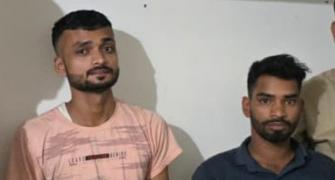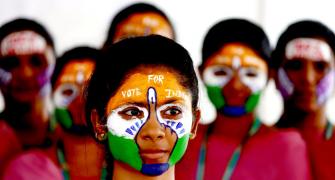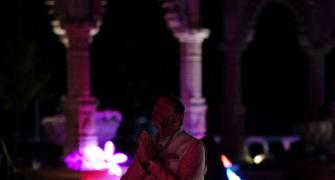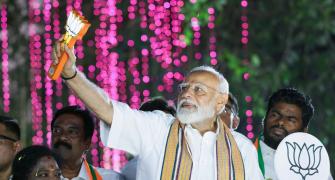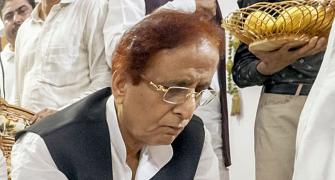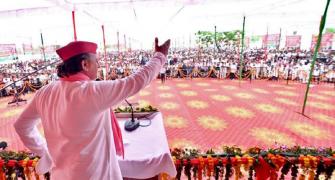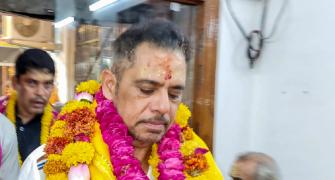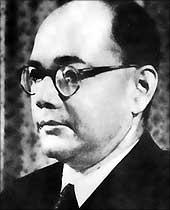 Rediff.com's Vicky Nanjappa speaks to Author Anuj Dhar about his latest book on Subhash Chandra Bose and uncovers some of the CIA's long-lost records, along the way.
Rediff.com's Vicky Nanjappa speaks to Author Anuj Dhar about his latest book on Subhash Chandra Bose and uncovers some of the CIA's long-lost records, along the way.
For the first time, the Central Intelligence Agency has declassified and released to an Indian citizen, two very important records -- pertaining to the death of freedom fighter and nationalist icon Subhash Chandra Bose and also the situation in India at the time of Partition.
The documents were made available to Dhar, author of the book, Back from Dead: Inside the Subhas Bose Mystery, in New Delhi."If the CIA could declassifiy this information, what stopped our government from doing the same?" Dhar told rediff.com.
Moreover the government has admitted to possessing reams of classified information of Bose. The Prime Minister's Office lists 33 classified files on Bose, a Right to Information query filed by Dhar revealed.
Dhar then filed an application under the US Freedom of Information Act and the Agency Release Panel considered his appeal and determined that the document that was initially denied in its entirety can now be released in part, with some information to remain protected from release on the basis of FOIA exemptions.
The documents made available to rediff.com by Dhar tells interesting stories, the main one being that even after reports of Bose's death, the spectre of his return from the United Soviet Socialist Republics remained strong enough to make many well-off Indians feel jittery
Dhar says that the number of documents released is small, but it is a turning point to end the excessive official secrecy thats exists in India. "The government is sitting on a stockpile of classified information on such great personality and the manner in which the Indian government handled the Russian angle as was mentioned by the Justice Mukherjee Commision left a lot to be desired," Dhar said.
Comments on the political situation during Partition:
The document released by the CIA gives some interesting insights into the political situation in India just after independence. The source of the information has however been protected in the document. The document goes on to state:
'I think it is quite possible that Liaquat Ali and (Jawaharlal) Nehru will finally submit to the partition of Kashmir in order that they may both save face. However I do not think that the people of either Pakistan or India are ready at the present to accept Partition but a wedge has been entered into their minds concerning partition which will eventually lead to that solution.'
'Although I studied the problem for one year, I never actually did find out how strong the religious feeling was. In the Partition of India and Pakistan or what really was underneath the religious cover. However it is my impression that the differences between India and Pakistan at the present time are not basically religious but largely nationalistic and economic.'
'I am also concerned about the strength of the Rashtriya Swayamsevak Sangh, when last spring (1950) Golwalkar (fomer RSS chief M S Golwalkar) came to Delhi after his release from jail. This militant Hindu organisation and the Mahasabha party (Hindu Mahasabha) have become a great focus for Hindu refugees. Both parties are backed by old conservative Hindu elements such as the Brahmins. Both the RSS and the Mahasabha stand for the same principles, the two most important being anti-Muslim and anti-West -- who they accuse of trying to breakdown the caste system. I think that Nehru has handled these parties very well and has not given them a chance to complain.'
'At the present I think Nehru wants both Soviet friendship and US money and to obtain both of these, he is trying to play both ends against the middle. I do not know how much Nehru's emotionality and racial pride, plus his Kashmiri blood affects his policy. His prepared statements represent a good governmental position, but when Nehru gets in front of a cheering crowd, he seems to go overboard in favour of whatever the crowd is enthusiastic about. His terrific emotionality makes him irresponsible at times and in my opinion, this is his biggest weakness, which is a dangerous thing in a country like India.'
'I strongly suspect that Nehru's conciliatory policy towards Pakistan is greatly influenced by the fact that there is still much Hindu property in Pakistan. I think he wants to avoid any difficulty with Pakistan until the Hindu property in Pakistan is recovered or compensated for. There are many people in Delhi who have vast holdings in Pakistan and they are currently trying to realize as much as possible from these properties.'
'There is one other political note that I should mention at this time because I think that it may have some potential danger in it. I was impressed on many occasions by the fact that Bose is still a very popular hero I the eyes of the Indians. Recently his life story was told in the Indian movies and I attended several different native theatres to study the natives' reaction.'
'Every time that the actor representing Bose appeared on screen, he was loudly applauded. This expression of great enthusiasm clearly indicated to me that Bose is a national hero and in the eye of the man on the street I think he ranks next to Gandhi.'
'It is now currently rumoured in Delhi that Bose living in Siberia, where he waits for a chance to make his big comeback. Officially Bose was declared lost, but his body has never been found. Whether Bose is alive or dead is relatively unimportant, but the possibility of an impostor should not be overlooked. I have several educated Indians tell me that the USSR would send a Bose 'impostor' into India and it would be easy to convince the people that he is Bose. If Bose or an impostor should return, it is probable that a great many of the people would accept his leadership. Some people believe the recurring rumour that Bose is still alive. According to their story Bose is presently active in the underground RSS movement.'
'I have one other point to make concerning the political thinking of Indian students. All agreed that something must be done in India. They also agreed that Indian and Asian independence must be maintained. None of them knew what the US had done for Cuba or the Philippines and none had any knowledge of American history. What they did think, however was that China had at least been freed from foreign influence. They fail to see any current Soviet influence in China. And they are a mirror of most of the intelligent and educated Indian people, have never been exploited by the Soviets but they think they have been exploited by the British and also the American people.'
Read the CIA dossier on Partition
Read the CIA dossier on Netaji Bose's death
Image: Subhash Chandra Bose
Photograph: Rediff archives

